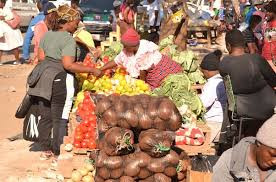
AFRICAN universities and financial institutions haven’t done much to correct the negative perception and discourse about African mass markets and informality.
An economic landscape in which smallholder farmers, artisans and traders have nurtured self-sufficient communities for decades cannot continue to be called informal and inferior.
By now, African universities should have studied how these secondary economies enable survival and wealth accumulation in non-conventional spaces and family enterprises.
If they were curious enough, African academics and bankers would have developed relevant methods for including sterling work by smallholder farmers, traders and MSMEs into gross domestic product calculations. That would have built pathways for allocating State resources and other forms of support to this important but under-appreciated economy.
Symbols of local economic resilience
Despite neglect and exclusion from the dominant economic paradigm, smallholder farmers and mass markets continue to epitomise resilience. Their resilience is reflected in their ability to stay afloat during shocks like COVID-19, droughts and in environments characterised by local and multinational corporate competition. The political and economic elite continue to use their influence in favour of foreign direct investment through subsidies and policy biases. Without similar support, mass market actors have resorted to African values and norms to hone indigenous commercial excellence. By holding onto alternative modes of production, based on indigenous traditions, practices and notions of place, informal economies are preventing the expansion of Western forms of capitalism.
As part of understanding informal economies, academic institutions and bankers should be refining and repackaging supply chains that have been operating informally for decades without support from government and development agencies. The fact that many investments have been made in many African communities in a fragmented manner continues to undermine development as several projects either work in silos or they fold without sharing critical lessons. Knitting, refining and packaging most of these initiatives can go a long way in advancing inclusive development.
The value of co-ordinating research to understand consumer tastes and preferences
- Young entrepreneur dreams big
- Chibuku NeShamwari holds onto ethos of culture
- Health talk: Be wary of measles, its a deadly disease
- Macheso, Dhewa inspired me: Chinembiri
Keep Reading
Through investment in research, colleges and universities should be able to stay up to date with domestic and foreign markets, as well as use literature review to keep local industry current. Eventually, they should be able to upgrade their curricula so that they stay fluid and up to date with the informal economy to influence policy. One major challenge across Africa is that research institutes are not adequately co-ordinated. Their collaborations are ad hoc and designed for media attention only, especially through trade fairs, agricultural shows and science symposia. If a quarter of the products exhibited at these events were commercialised and made available to the masses of African consumers, industrialisation would have gained a lot of ground in many African countries.
A key research theme that has been ignored by African universities and research institutions is changing consumer tastes and preferences. Unless food commodities produced by smallholder farmers and traded in territorial markets match changing consumer tastes and preferences, imports will continue to influence consumption patterns. Instead of spending a lot of money importing finished products, knowledge, seed and other inputs, investing in local research will enable African countries to not only save money but also direct resources towards home-grown solutions.
For instance, with more than 20 universities and research institutions, countries like Zimbabwe would, by now, have stopped importing knowledge and other inputs and relying on home-grown solutions. Long-term finance should also be extended to private research, with the government playing a regulatory role. This is because private research is good at attracting top talent and passionate, results-oriented researchers.
How can financial inclusion be achieved if banks don’t understand the informal economy?
Financial inclusion will remain a buzzword and very difficult to achieve if formal banks do not invest in understanding the informal economy. Limited interest by formal banks to understand the informal economy has fuelled the growth of the secondary or underground economy. As if that is not enough, the formal economy data underestimates the contribution of the underground economy. If the informal economy constitutes 60% of cash in circulation for day-to-day transactions, every US$100 in the secondary economy purchases commodities worth US$1 000 (ten times). That means the role of money in driving the economy is more pronounced in the secondary economy than the formal economy.
When some of the cash is kept in safes by formal institutions, that leads to inflationary tendencies because cash that should be oiling the economy will be lying idle. Holding depositors’ money in the bank withdraws that money from circulation. That money should be earning more for the depositor if brought into circulation through mass markets, not through loans as is done by banks. The high activity in mass markets keeps the money in commodities, enabling money to play its role as a medium of exchange. On the contrary, when money is kept in a safe, it ceases to be a medium of exchange. A farmer with US$100 000 worth of commodities needs a buyer who needs that money to buy those commodities and holding that money in the bank means the farmer will be stuck with his commodities.
By holding cash in the bank, formal banks are failing to see how they are slowing down the pace of economic development through systems that exclude active participants who should be using cash. Formal financial institutions have gone to the extent of valuing companies that they see as more secure, but how many companies have failed to repay loans to banks? Some banks have even gone under liquidation, but mass markets, the informal economy and the MSMEs have survived for decades. The collective collateral value of mass markets and MSMEs is worth billions of dollars, but banks have been reluctant to recognise that collateral value. That is why mass markets and the informal economy have become closed economies that trust their systems.
- Charles Dhewa is a proactive knowledge broker and management specialist.










